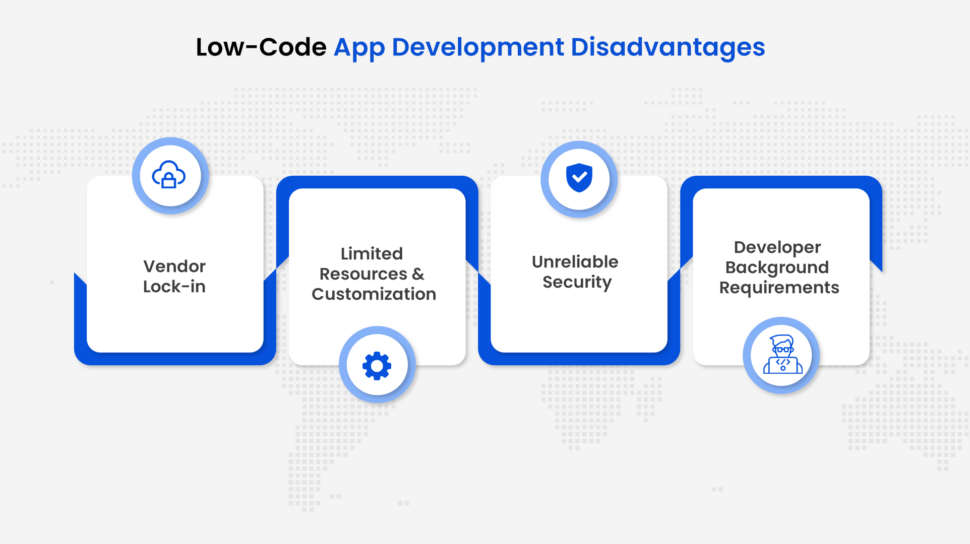A survey by Statista found that low-code development is 40% to 60% faster than traditional development.
Low-code app development has gained popularity recently on the back of its ability to simplify the app development process. It also comes with a slew of other benefits like code reusability, a faster development process, and lower development costs.
However, this potentially beneficial method is not suitable for apps that require high functionality and come with some downsides that you must consider. You should get familiar with some of its common aspects to know how disadvantageous it can be for your app.
What is Low-Code App Development?
Low-code app development is a method of development that includes automation, visual drag-and-drop UI components, and pre-written source code to help individuals develop apps without having a technical understanding of the process. The method is especially popular among mobile app startups with tight deadlines and a small budget, even though low-code mobile app development does not come with the guarantee of good UI/UX design, functionality, or data security.
Looking for affordable app developers?
Low-Code App Development Disadvantages
Analyze the downsides of low-code mobile app development and how it may damage your app/business before you choose it.

Vendor Lock-in
Vendor lock-in is a widely known con of low-code app development services, which can have both functional and financial disadvantages for your app. Some low-code tool vendors have a policy that allows them to create codes that are incompatible with other tools besides their own or code that cannot be rewritten or modified with any other low-code app development tools.
Choosing these low-code vendors will make your app dependent on their tools for any improvements as they will have control over every element of your app. Such lock-in can be an obstacle when your app is successful and needs advanced updates.
However, you can try to find vendors that create standardized source code with multi-platform compatibility or hire a professional mobile app development company for the traditional process. It may seem time-consuming or expensive, but it gives you total control over every aspect of your app.
Limited Resources and Customization
Business requirements determine the type of app you need to develop to get a decent user base and generate revenue. Unlike custom development tools, low-code mobile app development cannot always meet such requirements. For example, your app may need a highly creative UI/UX design or specific functionality like making video calls in a healthcare app.
Few to none low code platforms can meet such business requirements for your app. Low-code development platforms generally have pre-determined and limited customization options. They reduce your ability to be creative with the app by putting coding limitations on the development process.
There are always some or more limitations with low-code development that will force you to stop innovating in various areas of your app. For example, you may have to optimize your app for foldable devices, but the low-code platform may or may not have the technology to make that happen. In conclusion, traditional development is the right option to remove limitations from the development process.
Unreliable Security
Low-code platforms belong to vendors that are rarely a part of your organization/company. The security protocols such vendors have may not always be able to protect the confidential data about your app and business. It can lead to data theft/leaks, hacking, and other cyber attacks like man-in-the-middle (MITM) attacks and malware.
Unlike custom code, low code development includes shared control between you (app owner) and the low-code platform owners. It can compromise the data security of your app as you risk exposing confidential data to cyber attacks.
Need better app security?
Developer Background Requirements
The most common myth about low-code mobile app development is that anyone with no-coding experience can develop apps with it. Developing an app always requires some or more understanding of mobile apps, even with the simplicity of low code. The success of mobile apps depends on the quality of content, good user interface, and overall ease of use. Ensuring these factors in a mobile app requires experience to do it right. It means that you will need developers with some experience to make sure low-code development works for your app.
Going with traditional development is the best option since you have to hire experienced developers either way. The only difference is that regular coding helps create advanced apps with better UI/UX design, functionality, data security, and customization.
Conclusion
Low code may reduce mobile app development costs and simplify development, but it is not a viable option in the long run. The success of a mobile app depends on user experience and advanced functionality. For example, a social media app with a video and voice call option in the chat feature will lead to a better user experience than just a simple chat feature. Low-code app development cannot always meet such requirements and lacks the factor that helps create apps with the potential for lasting success.
Low code is feasible if and when you need to build an advanced prototype for a pitch meeting with investors. However, it is best to avoid this method when developing an app for end users that determine the revenue of your business. Traditional development will serve your business well by providing the option of creative customization as and when necessary. Talk to our developers at Ailoitte to get more expert insights on low code and its downsides, or request a project estimation to get it started.
Frequently Asked Questions
The disadvantages of low-code app development are vendor lock-in, limited resources and customization, unreliable security, and developer background requirements.
Low codes are like paper airplanes. They can only fly so high and far, no matter how big you make them or which paper material you use. They come with limitations that can stop an app from growing into what it needs to be to survive the competitive app market.
No, low code only removes the need for experienced developers. Any fresher or someone with an understanding of development can build apps with this method. In short, you need developers for low code as well.
Low code is one of the rising trends in mobile app development. However, it will not survive unless it removes the limitations of low-code tools in app development.


















.png)
.png)
.png)



Leave a Comment